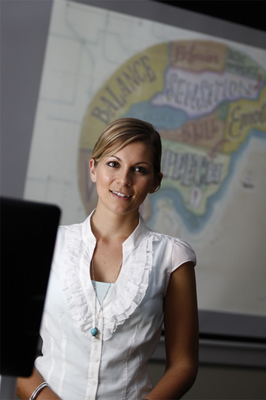A USC survey has found that one in five Sunshine Coast participants admitted they would not tell anyone if they had depression while most would discuss mental health concerns with family and friends but they didn’t believe they had the skills to help them.
The survey of 800 Sunshine Coast residents aged from 16 to 86 years was led by postdoctoral research fellow Dr Amanda Clacy and conducted by USC’s Sunshine Coast Mind and Neuroscience – Thompson Institute as part of its community partnership initiative The Alliance for Suicide Prevention – Sunshine Coast.
Dr Clacy said the findings highlighted the need for the public to increase their awareness of mental health issues, and gain the skills needed to support those close to them.
She said three in four people said they were likely to talk to their doctor about their mental health, which was a fairly positive statistic.
“But there is still a quarter of the population that isn’t confident that a doctor can help or has the skills to identify mental health concerns and provide them with support,” she said.
“GPs obviously have a vital role to play in reducing suicide rates, so there is a need to increase doctors’ confidence to act to help their patients and also increase the willingness of people to seek that help.”
Perhaps the most concerning find of all, Dr Clacy said, was that one in five people wouldn’t tell anyone at all if they had depression.
“This could be due to perceived stigma and personal shame around mental illness,” she said.
“Sixty-three percent of people believe stigma prevents people from seeking help, and findings indicate that unhelpful beliefs, such as that mental illness is a sign of weakness, still exist.”
Dr Clacy said one of the surprising findings of the survey was that there wasn’t a significant difference between the attitudes of males and females. Also surprising was the mistaken belief by people that depression was contagious and people with depression were dangerous.
The Alliance hosts free suicide awareness training every month, so people can learn how to identify when a person might be struggling and connect them to professional help and has also developed a program that integrates this training into workplaces.
Dr Clacy said signs of depression that people should look out included changes in behaviour such as not sleeping, changes in diet, a loss of passion for work or hobbies, or a lack of commitment or purpose.She said people with depression often perceive themselves to be a burden on others.
On average, one person per week dies by suicide on the Sunshine Coast, which is higher than the national average.
“Understanding how our community reacts to or manages mental illness is so important because we know that depression is a precursor to suicide,” she said.
Dr Clacy said the survey would be further analysed and information would be used to inform activities and develop future programs.








